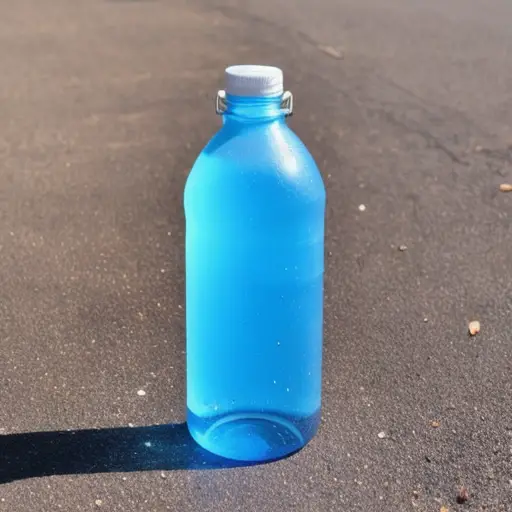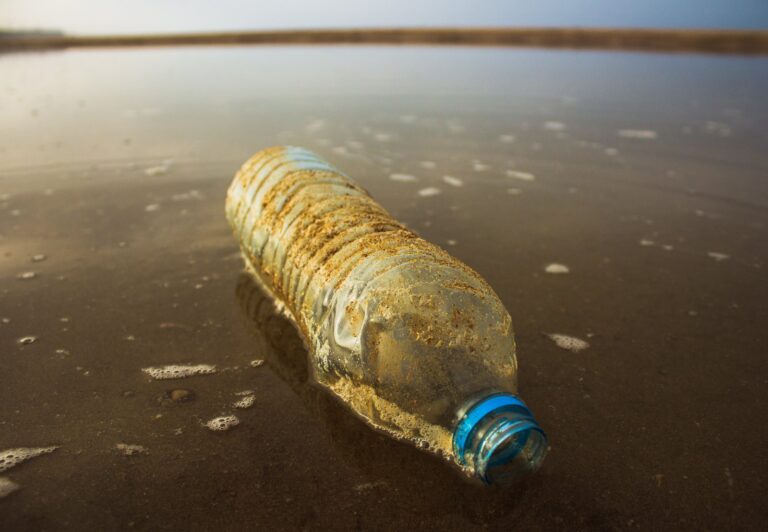If’re thinking of storing gasoline in a plastic water bottle, you might want to think twice. While plastic water bottles are convenient and often readily available, they may not be the safest option for storing gasoline. Gasoline can potentially eat through the plastic, causing it to weaken, become brittle, or even rupture over time. In this blog post, we’ll explore the facts behind whether gas can eat through a plastic water bottle and why it’s important to properly store gasoline in containers designed for fuel storage. Keep reading to learn more!
Definition of plastic and gasoline
Pl is a synthetic material made from polymers, which are long chains of molecules. It is a versatile material that is used in a wide range of products, from packaging materials to electronics. Gasoline, on the other hand, is a highly flammable liquid that is commonly used as a fuel for combustion engines. It is a complex mixture of hydrocarbons that is derived from crude oil. Certain plastics, such as PET and HDPE, can dissolve when exposed to gasoline because they have similar chemical structures. This can be dangerous when storing gasoline in plastic water bottles as the plastic can deteriorate and weaken over time, potentially leading to leaks and spills. It is important to use gasoline-specific containers made from materials that can resist the corrosive nature of gasoline to ensure safe storage and handling.
The potential risk of storing gasoline in a plastic water bottle
Storing gasoline in a plastic water bottle poses potential risks that should not be ignored. While plastic water bottles may seem like a convenient option for storing gasoline, they are not designed to withstand the corrosive and flammable nature of gasoline. Gasoline can eat through the plastic material of the bottle, causing it to weaken over time and potentially leak or rupture. This can lead to contamination of water and soil, harm to human health, and damage to property. Moreover, plastic residues from the bottle can contribute to pollution. Using gasoline-specific containers made of gasoline-resistant materials is crucial to ensure safe storage and disposal of gasoline. It is important to follow local regulations and avoid illegal and unsafe practices of storing gasoline to avoid potential hazards and risks.
Types of Plastic Materials
A. PET and HDPE plastics
When it comes to storing gasoline, it’s important to know which types of plastic containers are safe to use. PET (polyethylene terephthalate) and HDPE (high-density polyethylene) are two common types of plastic that are often used for water bottles. However, gasoline can eat through PET plastic over time, potentially causing leaks and other hazards. On the other hand, HDPE plastic is more resistant to gasoline and is commonly used for fuel storage containers. It’s crucial to choose gasoline-resistant materials when storing or transporting fuel to prevent potential harm to human health, the environment, and property. By using gasoline-specific containers made from resistant materials and following local regulations, you can ensure safe and responsible fuel storage.
B. Gasoline-resistant materials
When it comes to storing fuel, it is essential to use gasoline-resistant materials to avoid any potential hazards. Some plastics, such as PET and HDPE, are not suitable for storing gasoline as they may weaken, dissolve or even melt over time. However, containers made of high-density polyethylene (HDPE) are more resistant to the corrosive nature of gasoline, making them a safer option for storing fuel. It is important to note that gasoline should only be stored in containers that are specifically designed for fuel storage to ensure safety and prevent leaks. Using plastic water bottles for gasoline storage is not advisable as gas exposure can cause the bottle to leak or rupture over time, leading to potential hazards. Always follow local regulations and use appropriate containers for gasoline storage to minimize any harmful effects on human health and the environment.
Effects of gasoline on plastic materials
Gasoline can have detrimental effects on plastic materials when stored in the wrong type of container. The chemical structure of gasoline can weaken and even dissolve certain plastics, such as PET or PVC, causing the plastic to become brittle and potentially leading to leaks or even complete failure of the container. This not only poses a risk to personal health and the environment, but it can also result in damage to property and contribute to pollution. It is crucial to use containers specifically designed for fuel storage, made from materials that can resist the corrosive nature of gasoline. Using plastic water bottles or other non-approved containers for gasoline storage is unsafe and may even be illegal in some jurisdictions. It is always important to follow local regulations and use appropriate safety precautions when handling flammable liquids like gasoline.
Consequences of Gas-Eating through a Plastic Water Bottle:
A. Harmful effects on human health and the environment
The effects of gas and plastic on human health and the environment should not be taken lightly. Exposure to gasoline can cause potential harm to human health, such as breathing difficulties and skin irritation, not to mention the risk of fire or explosion. Moreover, discarded plastic water bottles have a significant impact on the environment as they do not biodegrade well, ending up in landfills or in the ocean. The chemicals in plastic can leach into the soil and contaminate groundwater, causing harmful effects to human health. Ingesting harmful substances from contaminated water can pose a risk to public health. It’s crucial to store and dispose of gasoline and plastic properly by using approved containers and following local regulations to avoid potential hazards. By doing so, we can protect both our health and the environment.
B. Damage to property
Using a plastic water bottle to store gasoline can result in damage to property over time. This is due to the fact that gasoline can react with the plastic material, causing it to weaken, swell, and eventually break down. Leaks and spills can occur, leading to potential hazards. The consequences of gas-eating through a plastic water bottle can be severe, from contamination of water supplies and soil, to damage to property. The use of non-approved containers such as plastic water bottles for gasoline storage is also illegal in many jurisdictions. Therefore, it is important to follow local regulations and use appropriate containers for fuel storage, such as those specifically designed for gasoline. Taking safety precautions and storing gasoline properly will help prevent potential damage to property and ensure a safe environment for all.
C. Pollution caused by plastic residue
Pl pollution is a serious issue that threatens our environment and health. When plastic materials degrade, they often release toxic chemicals into the environment and break down into microplastics that can cause harm to wildlife and humans alike. Single-use plastic bags alone contribute to billions of tons of plastic waste that end up in landfills and the ocean, where they can cause serious harm to marine life. It’s estimated that by 2050, there will be more plastic in the ocean than fish. If we don’t take action to reduce our plastic waste, we risk irreversible damage to our planet. That’s why it’s so important to support legislation and initiatives that promote waste reduction and the use of sustainable materials. By working together, we can protect our planet and ensure a healthy future for generations to come.
Safe Storage and Transportation of Gasoline
A. Recommended containers for fuel storage
When it comes to storing fuel, it is essential to use containers made specifically for the task. Using a plastic water bottle or other non-approved container can be dangerous and even illegal in many jurisdictions. It is recommended to use containers that have been approved by Underwriters Laboratories (UL) or Factory Mutual (FM) for storing gasoline. These containers are made from materials that can resist the corrosive nature of gasoline and are designed with safety features such as proper venting and spouts for safe handling. Some examples of suitable containers include those made of high-carbon steel, hard plastic, or fiberglass. It is also important to follow local regulations and guidelines for fuel storage to ensure the safety of yourself, others, and the environment. By using approved containers, we can ensure that our fuel is safely and securely stored for future use.
B. Illegal and unsafe practices for storing gasoline
St gasoline in inappropriate containers such as plastic water bottles is not only unsafe but also illegal in many jurisdictions. Glass containers and plastic bottles are typically not designed to withstand the corrosive nature of gasoline, which can cause them to weaken, dissolve, or become brittle over time. This can lead to potential hazards such as leaks, spills, fires, or even explosions. Moreover, gasoline exposure can be harmful to human health and the environment. Therefore, it is crucial to follow local regulations and use approved containers specifically designed for fuel storage and transportation. Furthermore, it is important to avoid illegal and unsafe practices such as storing gasoline in containers that are not ventilated or labeled, storing gasoline near sources of heat or flames, or transporting gasoline in open containers. By taking these safety precautions, we can minimize the risks and hazards associated with gasoline storage and transportation.
C. Importance of following local regulations
It’s important to follow local regulations when it comes to storing and transporting gasoline. The laws and regulations surrounding the proper handling of gasoline are put in place to protect you, those around you, and the environment. There are specific regulations that dictate what type of containers are safe to use, what types of storage facilities are acceptable, and how gasoline should be transported. It’s important to educate yourself on the regulations in your area and to follow them closely. By doing so, you can ensure that you are storing and transporting gasoline safely, preventing potential hazards and avoiding any legal consequences. Remember, safety should always be a top priority when handling flammable materials, and following local regulations is a crucial step in ensuring that safety.
Comparison of Plastic Water Bottles and Gasoline-Specific Containers
A. Differences in material strength and resistance
When it comes to storing gasoline, it’s important to choose the right type of container to avoid potential hazards and risks. Not all plastic materials are created equal, and some may deteriorate and weaken when exposed to gasoline or alcohol, leading to leaks or ruptures. It’s crucial to select containers made from materials that are resistant to the corrosive nature of gasoline, such as high-density polyethylene (HDPE) or approved portable fuel containers. While plastic water bottles may seem like a convenient option, they are not designed for gasoline storage and can pose significant risks. It’s always best to follow local regulations and use appropriate containers for gasoline storage to ensure safety and prevent damage to belongings, pollution, and harm to health and the environment.
B. Risks and dangers of using plastic water bottles
Using water bottles to store gasoline can be extremely dangerous and should be avoided at all costs. Gasoline is a highly flammable substance that can cause explosions or fires when exposed to any source of heat or spark. Over time, gasoline can weaken or dissolve certain types of plastic bottles, causing them to swell, become brittle, or even crack. This can lead to leaks, spills, or contamination of the environment. Furthermore, plastic water bottles may contain chemicals such as Bisphenol A (BPA) and phthalates, which can leach into the water and pose a serious health risk to consumers. In short, using plastic water bottles to store gasoline is both illegal and unsafe, and can result in significant harm to human health and the environment. It is therefore important to follow local regulations and use appropriate containers specifically designed for fuel storage to ensure safety and prevent potential hazards.
C. Benefits and advantages of gasoline-specific containers
One the benefits and advantages of using gasoline-specific containers is that they are specially designed to resist the corrosive nature of gasoline. These containers are made from materials that have high resistance and strength to withstand the effects of gasoline, ensuring that there is no leakage or rupture over time. They also have proper venting and spouts for safe handling, preventing any hazardous accidents. Additionally, using gasoline-specific containers helps avoid potential hazards and risks associated with using plastic water bottles or other inappropriate containers. By following proper guidelines and using only approved containers, you can assure safe fuel storage and avoid any damage to your property or harm to human health and the environment. Always prioritize safety and follow local regulations when storing gasoline.
B. Safety precautions to avoid hazards and risks
When comes to storing gasoline, it’s important to take the right safety precautions to avoid any hazards and risks. Always make sure to store gasoline in containers that are specifically designed for fuel storage, such as approved portable fuel containers made from gasoline-resistant materials like high-density polyethylene. Avoid using plastic water bottles as they are not designed to withstand the corrosive and dissolving nature of gasoline. It’s also essential to follow local regulations and laws surrounding fuel storage and disposal. Additionally, make sure to transport gasoline safely, using proper containers and avoiding any potential sources of ignition. Taking these safety precautions can help prevent accidents, minimize the risk of contamination to the environment and people, and keep property safe from damage. Stay knowledgeable about the effects of gasoline on plastic materials, and always prioritize safety above all.




